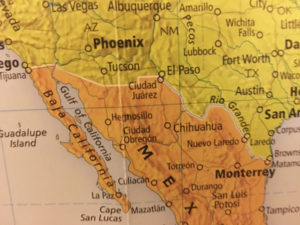On Jan. 21, Ana Aguayo stood on the steps of the State Capitol and admitted – proclaimed, you might say – before thousands of people including police officers that she was committing a crime.
Ana, 28, is an undocumented immigrant, so her crime is not crossing the border to return to a homeland that hasn’t been home for a very long time. At the age of 8, she was bought by her parents from Guadalajara to Springdale, where she was raised knowing nothing of her status. Her teachers taught her English and helped her integrate into the community, and by the age of 16 she was pretty much an American girl.
That’s when she found out she wasn’t. When her peers started getting driver’s licenses and jobs, she learned she wasn’t like them, that she was an unacknowledged guest and not part of the family. And it changed her childhood.
“I grew up living in fear and in the shadows and at a time where the media identified myself as a criminal, when I didn’t understand what had happened, that my parents crossed the border unbeknownst to me,” she said in an interview.
Along with the fear came the frustration of realizing how many doors would be shut because of her status. So she channeled that frustration in a positive direction by carpooling and getting rides and being involved in the community. As an adult, she became a development officer and now works for the Crystal Bridges Museum of American Art.
At the Women’s March for Arkansas that day, which occurred at the same time as other marches in Washington and across the world, she told the crowd from the Capitol steps, “Because of individuals like you, a shy young girl is able to stand before you (at) a podium and plead your support. Living in the shadows is something we can no longer do.”
Helped through DACA
Emerging from those shadows was easier because of Deferred Action for Childhood Arrivals, or DACA, an Obama administration policy restricting enforcement of immigration laws regarding children brought to America as children.
But President Trump has since announced he was ending the program after facing a lawsuit by nine state attorneys general, including Arkansas’, that said it is unconstitutional. Trump has given Congress six months to come up with a fix and has raised some eyebrows by negotiating its status with Democratic congressional leaders.
Asked what it would mean if she were told simply to go home, she said, “It would be very challenging because the United States, Arkansas, is the only home I’ve ever known. It would be unfortunate because the skill set I would have provided would go to Mexico, most likely, and I would try to find a job and build my life.”
Send her back?
That would be grossly unfair of the United States, and, frankly, pretty stupid. She had no choice about whether or not she came here 20 years ago. Taxpayers have spent somewhere in the neighborhood of $100,000 giving her an American education. She wants to work, wants to contribute and wants to make Arkansas a better place. I can think of a lot of people with American birth certificates I’d rather send over the border. Can’t you?
It’s one thing to speak about immigration in political terms, but it’s another when it’s an actual person, when “illegal immigrant” becomes “Ana Aguayo.”
This is a divided country. None of us will get everything we want. But consensus ought to be achievable on this issue. Secure the border as best we can. Focus on the criminals and potential terrorists who might already be here. And if you were brought here as a child and have since lived like a responsible American, you can become one.
The rest of the details, we can still fight about. We always do.
Related: What kind of country?
Immigrants needed to pay for Social Security, Medicare.
© 2017 by Steve Brawner Communications, Inc.

Amen!
Excellent piece, Mr Brawner. I’m not sure why, but there are many who choose to ignore the human side of illegal immigration (and yes, I acknowledge that it is illegal).
Bravo, Steve! This is a wonderful article.
Thank you, Sandy, Melanie and Dave. Yes, it’s true – there is a human side and a legal side, and both are important.
Well said, Steve!